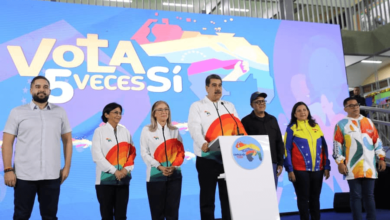A U.S. delegation, including members of the Party for Socialism and Liberation, is welcomed at “Campamento de Pioneros 22 de Enero,” a communal housing project built on land expropriated by working-class Venezuelan families, Caracas, June 22. We were in Venezuela for the “Bicentennial Congress of the Peoples of the World,” in celebration of the country’s independence victory over Spain on June 24, 1821, led by the Liberator Simón Bolívar.
The housing commune was initiated under the Great Venezuela Housing Mission (GMVV), a project launched in 2011 by President Hugo Chávez to provide truly affordable housing, with priority given to those living in precarious conditions.
In its first seven months, nearly 100,000 homes were constructed under the Great Venezuela Housing Mission. The original goals set out by President Chávez have been greatly surpassed, with over 3.5 million homes delivered as of 2021. The Bolivarian Constitution created in 1999 enshrined housing as a human right for every Venezuelan.
Housing shortages, slum housing and overcrowded conditions plagued Venezuela for years prior to the Bolivarian Revolution. Heavy rains in 2010 and natural disaster displaced thousands, prompting President Hugo Chávez to initiate the unprecedented large-scale housing program.
The state also committed to providing services to new housing communities built under GMVV, including social programs, CLAP food distribution, childcare, schools, health clinics and other social services. The homes are also furnished with household appliances, such as refrigerators, ovens and washing machines.
22 de Enero is part of the national “Pioneer Camps” movement in Venezuela, which fights for the right to urban land and against the commercialization of housing. It is an example of a “self-build” housing project, those based on principles of self-management, participatory planning, collective responsibility and property, and solidarity. Residents contribute four hours each day to help build the project.
The 22 de Enero commune is surrounded by wealthy neighbors in the Chacao municipality of Caracas. Working-class families expropriated the land in 2011, with the support of the Bolivarian government. Banking and financial instructions also support GMVV projects by increasing the amount of loans made available for buying, constructing and renovating homes.
The working-class families who live here have built the homes themselves, supported with supplies, training, and resources provided primarily by the Bolivarian government. Over half of GMVV projects have been undertaken with the participation of the local communities, reflecting President Hugo Chávez’s vision for a popular mass-based program.
Building socialist consciousness is key to sustaining and strengthening the commune. The families who join must not only have a real need for housing, but also be committed to principles of collectivity, cooperation and mutual support. The aim of the Campamento de Pioneros movement is to “transform the capitalist social relations of production in the city and generate a decent habitat for all Venezuelan families.”
Political and popular education strengthens group unity as the project continues. During the delegation visit, young people performed skits highlighting revolutionary women ancestors and speakers shared about the importance of the historic Battle of Carabobo, a key battle in Venezuela’s struggle for independence.
The latest goal of the Great Venezuela Housing Mission is to deliver five million homes by 2025. As Venezuela continues to battle the U.S. imperialist economic, trade and financial blockade, the community-driven methods of construction seen in the Campamento de Pioneros movement have become increasingly critical to creating new housing.
Severe and criminal unilateral sanctions by the United States government against Venezuela, begun under George W. Bush and Barack Obama, intensified by Donald Trump, and continuing under Joe Biden, have severely impacted the everyday people of Venezuela, like the families at the commune. The U.S. government has stopped ships, stolen cargo and blocked financial transactions, preventing the Bolivarian government from securing the building materials necessary for its housing projects.
The resolve of the Venezuelan working-class is unwavering. Anti-imperialists and people of conscience in the United States and around the world must stand in solidarity with the working-class people of Venezuela! End the imperialist U.S. sanctions now!




